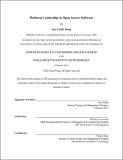| dc.contributor.advisor | Michael Cusumano. | en_US |
| dc.contributor.author | Wong, Ken Chi Ho | en_US |
| dc.contributor.other | System Design and Management Program. | en_US |
| dc.date.accessioned | 2015-12-16T15:55:04Z | |
| dc.date.available | 2015-12-16T15:55:04Z | |
| dc.date.copyright | 2015 | en_US |
| dc.date.issued | 2015 | en_US |
| dc.identifier.uri | http://hdl.handle.net/1721.1/100313 | |
| dc.description | Thesis: S.M. in Engineering and Management, Massachusetts Institute of Technology, Engineering Systems Division, System Design and Management Program, 2015. | en_US |
| dc.description | This electronic version was submitted by the student author. The certified thesis is available in the Institute Archives and Special Collections. | en_US |
| dc.description | Cataloged from student-submitted PDF version of thesis. | en_US |
| dc.description | Includes bibliographical references (pages 125-134). | en_US |
| dc.description.abstract | Industry platforms in the software sector are increasingly being developed in open source. Firms seeking to position themselves as platform leaders with such technologies must find ways of operating within the unique constraints of open source development. This thesis aims to understand those challenges by analyzing the Android and Hadoop ecosystems through an augmented version of Porter's Five Forces framework proposed by Intel's Andrew Grove. The analysis finds that platform contenders in open source behave differently depending on whether they focus on competing against alternative platforms or alternative providers of the same platform as rivals. This focus informs key decisions that the firm takes, including how it interacts with complementors and its approach to innovation. Due to the fact that open source vendors tend to lack unilateral authority over technology decisions, they can only seek to influence the behavior of the ecosystem by securing key relationships in the value network. In particular, they must secure the right engineering talent, access to key complements and superior paths to the customer. The research highlights some of the factors and tactics platform contenders in Hadoop and Android considered in acquiring these relationships. The open nature of FOSS (Free and Open Source Software) also allow new technologies to emerge and change the definition of the platform's boundaries. This creates a further strategic challenge for open source platform contenders. Keywords: platform strategy, platform leadership, open source software, Hadoop, Android. | en_US |
| dc.description.statementofresponsibility | by Ken Chi Ho Wong. | en_US |
| dc.format.extent | viii, 134 pages | en_US |
| dc.language.iso | eng | en_US |
| dc.publisher | Massachusetts Institute of Technology | en_US |
| dc.rights | M.I.T. theses are protected by copyright. They may be viewed from this source for any purpose, but reproduction or distribution in any format is prohibited without written permission. See provided URL for inquiries about permission. | en_US |
| dc.rights.uri | http://dspace.mit.edu/handle/1721.1/7582 | en_US |
| dc.subject | Engineering Systems Division. | en_US |
| dc.subject | System Design and Management Program. | en_US |
| dc.title | Platform leadership in open source software | en_US |
| dc.type | Thesis | en_US |
| dc.description.degree | S.M. in Engineering and Management | en_US |
| dc.contributor.department | System Design and Management Program. | en_US |
| dc.contributor.department | Massachusetts Institute of Technology. Engineering Systems Division | |
| dc.identifier.oclc | 932127325 | en_US |
